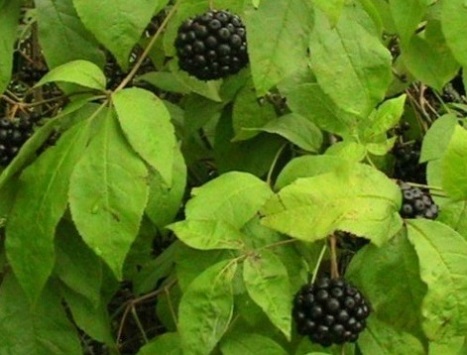Phytochemicals from Acanthopanax Senticosus Plant Found to Block Brain Inflammation and Cognitive Decline in Alzheimer
Nikhil Prasad Fact checked by:Thailand Medical News Team Apr 15, 2025 18 hours, 38 minutes ago
Medical News: Scientists from Zhengzhou University in China have uncovered promising evidence that a plant long used in traditional Chinese medicine could hold the key to treating Alzheimer’s disease. Their new research reveals that Acanthopanax senticosus saponins (ASS) — natural compounds extracted from the roots and stems of the Acanthopanax senticosus plant — can prevent memory loss and brain damage in rats with Alzheimer’s-like symptoms.
 Phytochemicals from Acanthopanax Senticosus Plant Found to Block Brain Inflammation
Phytochemicals from Acanthopanax Senticosus Plant Found to Block Brain Inflammation
and Cognitive Decline in Alzheimer
Alzheimer’s disease is a growing global health crisis, affecting tens of millions of people worldwide, especially older adults. It leads to progressive memory loss, confusion, cognitive decline, and eventually, full dependency. Currently, there is no cure. Most medications only offer temporary symptom relief, and many come with serious side effects. This
Medical News report highlights the urgent need for alternative, safer therapies — a gap that researchers now believe could be filled by traditional plant-based remedies like Acanthopanax senticosus saponins (ASS).
Herbal Remedy Shows Remarkable Brain Benefits in Rats
In the study, researchers from the Department of Physiology and Neurobiology at Zhengzhou University induced Alzheimer’s-like symptoms in rats by injecting a chemical called streptozotocin (STZ) into their brains. This chemical is known to cause brain inflammation, damage neuron signaling, and trigger memory loss, mimicking key aspects of Alzheimer’s disease.
After confirming the rats developed memory problems through maze tests, scientists gave some of them daily injections of ASS for two weeks. The results were striking. Rats treated with Acanthopanax senticosus saponins performed significantly better in learning and memory tests compared to untreated rats. They took less time to find a hidden platform in a water maze and spent more time exploring the correct area where the platform used to be. These improvements suggest that Acanthopanax senticosus saponins helped protect or even restore cognitive function in the animals.
How It Works Reducing Inflammation and Damaging Proteins
One of the major breakthroughs of the study was discovering how Acanthopanax senticosus saponins worked in the brain. In Alzheimer’s disease, brain cells become inflamed and produce high levels of harmful proteins like Tau, which clump together and damage neurons. This process is often driven by certain chemical signals like NF-κB, a protein that triggers inflammation, and DAPK1, a molecule that helps add toxic phosphate groups to the Tau protein.
Acanthopanax senticosus saponins was found to block this destructive chain reaction. Treated rats showed dramatically lower levels of inflammatory markers such as IL-1β, TNF-α, and NLRP3. They also had reduced levels of DAPK1 and phosphorylated Tau — both of which are directly li
nked to cognitive decline. Interestingly, a drug known to block NF-κB (called SN50) produced similar results, suggesting that ASS may work by interfering with the same inflammation-related pathways.
More Neurons Survived in Treated Brains
Microscopic examination of brain tissue revealed even more good news. The hippocampus — a region vital for memory — showed severe neuron loss in untreated Alzheimer’s-model rats. But in the Acanthopanax senticosus saponins-treated group, the number of neurons in this region was notably higher. This suggests that the herbal extract not only reduced inflammation and Tau damage but also helped preserve or regenerate brain cells.
The Power of Plant-Based Healing
Acanthopanax senticosus has a long history in Chinese medicine, often used to boost energy, improve focus, and calm the nerves. This study adds modern scientific evidence to its healing potential. Researchers believe the plant’s saponins — compounds known for anti-inflammatory and antioxidant properties — play a major role by stopping inflammatory responses in the brain and protecting neurons from stress and death.
The authors also highlight that the positive effects seen in rats were achieved with a moderate dosage over just 14 days, raising hopes that a safe, plant-derived therapy for Alzheimer’s might one day be developed for humans.
Conclusion
This study is an exciting step forward in the search for safer, more natural treatments for Alzheimer’s disease. By using a well-established animal model, scientists showed that Acanthopanax senticosus saponins can significantly reduce brain inflammation, block damaging Tau protein buildup, protect neurons, and improve memory. While more studies, including human clinical trials, are needed before this herbal treatment could be widely recommended, the findings offer a hopeful new direction. Natural plant compounds like Acanthopanax senticosus saponins may provide a multi-pronged approach to battling Alzheimer’s — something current medications have failed to achieve.
The study findings were published in the peer reviewed International Journal of Molecular Sciences.
https://www.mdpi.com/1422-0067/26/8/3715
For the latest on Herbs and Phytochemicals, keep on logging to Thailand
Medical News.
Read Also:
https://www.thailandmedical.news/news/phytochemical-compound-from-certain-orchids-shows-promise-for-brain-health-and-alzheimer-s-disease
https://www.thailandmedical.news/news/adaptogens-such-as-arctic-root-and-ashwagandha-support-neurogenesis-and-cognitive-recovery-in-cases-of-brain-fatigue
https://www.thailandmedical.news/news/xanthohumol-from-the-hop-plant-can-prevent-neurodegenerative-diseases-and-aid-in-brain-health
https://www.thailandmedical.news/articles/alzheimer,-dementia-
https://www.thailandmedical.news/articles/herbs-and-phytochemicals
https://www.thailandmedical.news/pages/thailand_doctors_listings
